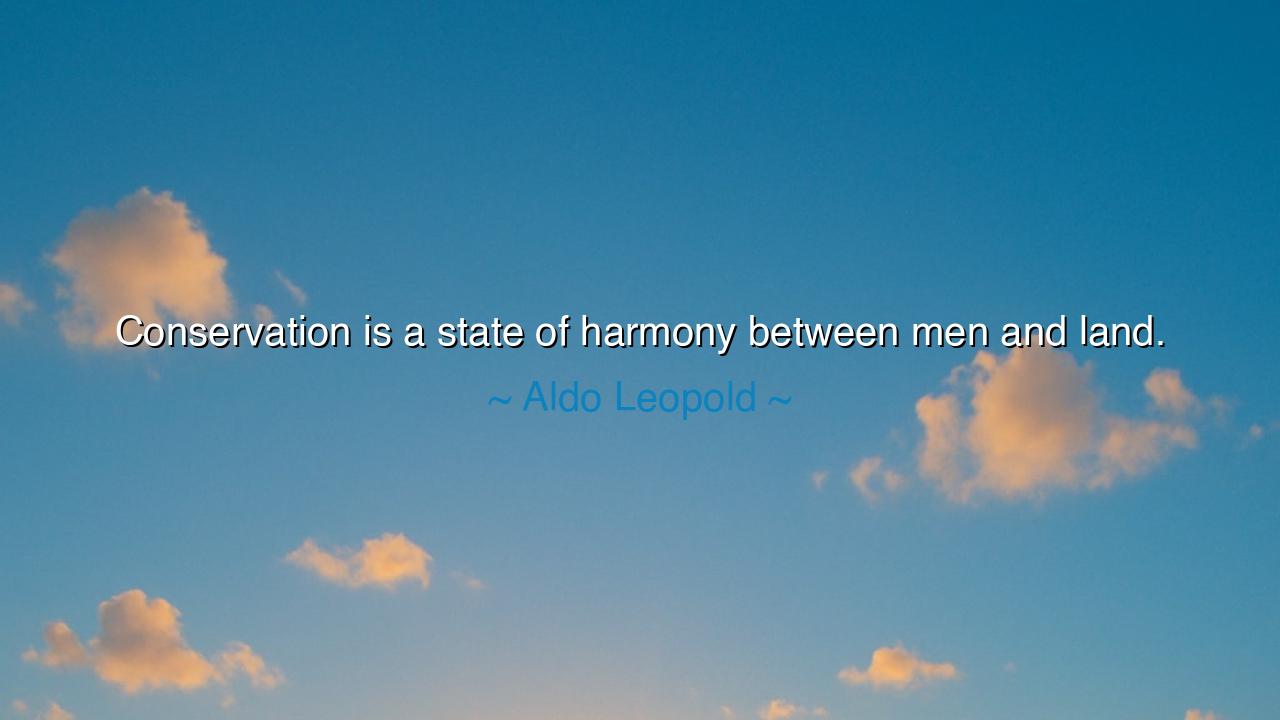
Conservation is a state of harmony between men and land.






“Conservation is a state of harmony between men and land.” Thus spoke Aldo Leopold, the wise naturalist whose soul was tuned to the quiet rhythms of the earth. In this simple yet profound utterance lies a truth as old as creation itself: that the bond between humanity and nature is not one of dominion, but of harmony. For the land is not merely the ground beneath our feet—it is the mother of all life, the silent partner in our existence. To live without harmony with her is to live in discord with ourselves.
Leopold, who wandered the woods and prairies of America with both scientist’s eye and poet’s heart, was not merely speaking of preservation in the mechanical sense. His words were born of the Land Ethic, his philosophy that man must see himself not as conqueror of the land, but as a member of its community. He watched as forests were felled, rivers choked, and species vanished, and he knew that conservation could not be achieved by laws alone—it required a change of heart. True conservation, he said, is not the fencing off of nature, but the restoration of a relationship; it is a state of harmony, a music between the human soul and the living world.
From the dawn of civilization, mankind’s story has been entwined with the land. The ancients tilled the soil with reverence, prayed to the rain, and offered gratitude to the spirits of the earth. But as time passed and machines replaced the plowman’s hand, this sacred relationship was forgotten. The land became “resource,” the forest “timber,” the river “power.” Man, in his haste to rise, forgot the ground from which he rose. Leopold’s words call us back to remembrance—to rediscover what our ancestors knew: that the health of the land and the health of the people are one and the same.
Consider the tale of the Dust Bowl of the 1930s, that dark chapter in America’s history. Farmers, eager to tame the prairies, plowed endlessly, stripping the land of its native grasses. For a time, they rejoiced in their bounty—but then the rains ceased, and the wind came. The earth, unanchored and exhausted, rose into the sky as black clouds of dust, devouring farms, homes, and hope. It was not nature that betrayed man, but man who betrayed nature. Out of that tragedy, Aldo Leopold and others came forth with new wisdom: that the soil is alive, that it must be cared for as one cares for a friend. From ruin was born renewal, and the conservation movement took root.
But harmony cannot be commanded—it must be cultivated. It is a living relationship, requiring humility and patience. To be in harmony with the land is to listen: to know when to sow and when to rest, when to take and when to give back. It is to recognize that every creature has its role—the wolf balancing the deer, the bee pollinating the flower, the roots binding the soil. When we destroy one thread of this web, we weaken the whole. Conservation is the art of living as part of the song of creation, not drowning it out with our own noise.
Leopold understood that this harmony begins not in governments, but in hearts. “We abuse the land,” he wrote, “because we regard it as a commodity belonging to us. When we see it as a community to which we belong, we may begin to use it with love and respect.” Each of us has a role to play in this restoration. Whether through planting a tree, tending a garden, protecting a river, or simply walking the earth with reverence, we participate in the ancient covenant between man and nature. Every act of care is a note in the song of harmony.
So let this teaching be passed to those who come after: conservation is not merely a duty—it is a way of life, a measure of wisdom. It asks us to remember that we are not separate from the land, but shaped by it. The breath we take is the breath of the trees; the food we eat is the gift of the soil; the life we live is a reflection of the world we sustain. To live without harmony is to live in discord; to live with harmony is to live in peace.
Therefore, walk gently upon the earth. Let your hands heal, not harm; your choices nourish, not deplete. Seek not to rule the land, but to dwell within it as a partner, a protector, a friend. For in that sacred balance, that state of harmony between men and land, lies the promise of renewal—the ancient truth that when we care for the earth, the earth will care for us.






AAdministratorAdministrator
Welcome, honored guests. Please leave a comment, we will respond soon